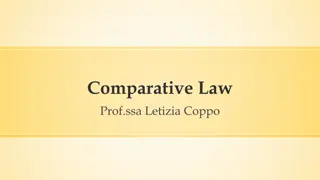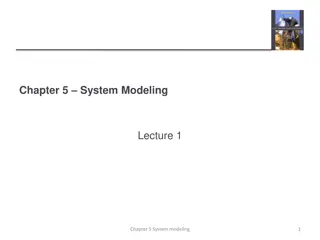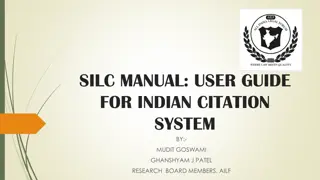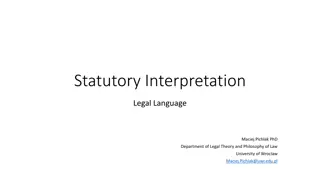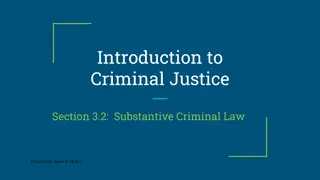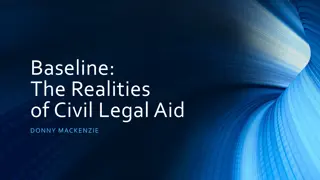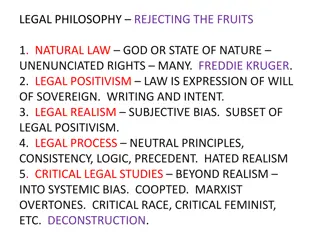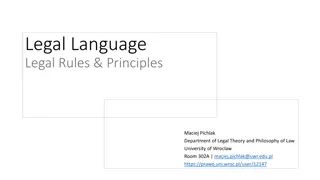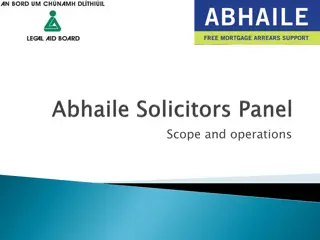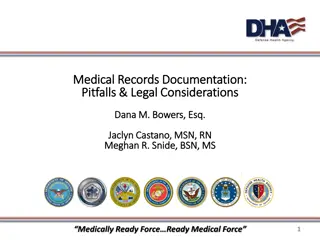Understanding the American Legal System: Insights and Perspectives
Explore an in-depth overview of the American legal system, covering the branches of government, torts, civil litigation, power relationships, judicial independence, and the role of judges. Delve into the intersection of the legal system and political structures, examining real issues and the dynamics of interpretation versus legislation. Gain valuable insights into the complexities of adjudication and how judges shape the law through their decisions.
- American Legal System
- Government Branches
- Civil Litigation
- Judicial Independence
- Interpretation versus Legislation
Download Presentation

Please find below an Image/Link to download the presentation.
The content on the website is provided AS IS for your information and personal use only. It may not be sold, licensed, or shared on other websites without obtaining consent from the author. Download presentation by click this link. If you encounter any issues during the download, it is possible that the publisher has removed the file from their server.
E N D
Presentation Transcript
Introduction to the American Legal System Prof. John T. Nockleby Director, Journalist Law School
Today: Three Goals 1. Overview of legal system the Third Branch of Government 2. Overview of torts, with special attention to who should pay for losses 3. Perspectives on civil litigation from Plaintiff & Defense lawyers Breakout: Overview of Class Actions
Co-Equal Branches Federal State Legislative Executive Judicial Legislative Executive Judicial
Power Relationship of Legal System to Political System Judges elected (39 states) for term, or appointed (federal & some states) Judicial Independence the idea that neither political system nor powerful entities should control 3d branch Political pressures over 3d branch exercised in limited & controlled fashion Note: these comments address both Federal and state systems
Relationship of legal system to political system CONVENIENT MYTHOLOGY: Political bodies make the law; judicial branch MERELY interprets
The Political Game SLOGANS: Legislating from the Bench Supreme Court nominees are asked about these at confirma- tion hearings Strict Constructionist A Living Constitution Judges are like umpires; umpires don t make the rules, they apply them.
REAL ISSUES: Which theories of interpretation do we want our judges to employ? What background and political orientation do we want our judges to have? How does interpreting law differ from politics?
Journalists often wonder . What is the law concerning a given subject? How will a certain case come out? Often difficult to answer because judges make law in the process of adjudication So, let s examine what is adjudication
The Adjudicative Process Adjudication starts with a case or controversy E.g., criminal prosecution E.g., filing of a lawsuit Courts can only act or make decisions in the context of an active case; U.S. courts have no authority to act unless there s a case & the court has jurisdiction.
Example of adjudication Suppose Plaintiff files lawsuit If the governing rule of law clearly applies, trial court will apply the rule Courts have power to change the rule, but if the rule was put in place by a higher court up the ladder, the lower court won t Most rule changes are made by higher courts Notably, courts can change the rule or make a new one and apply it to the case at hand.
While adjudicating cases, judges can make law in THREE Important ways: 1. Judges decide what the general phrases in the Constitution mean ( due process; equal protection ) 2. Judges decide what statutes mean, and fill gaps, decipher ambiguities 3. Judges make common law
1. Interpreting the Constitution A. In U.S., judges have the final word on what the constitution means Judicial Review of legislation Marbury v Madison B. Judges decide what general phrases mean: due process equal protection abridging the freedom of speech Habeas Corpus
2. Judges Interpret Statutes, Fill Gaps, Adjudicate Ambiguities Many statutes incorporate vague language Entire statutory body of antitrust contained in few vague phrases ( restraint of trade ; monopolization ) Civil Rights statutes use broad phrases like discrimination or unequal Political bodies punt difficult issues to judicial system Legislating from the bench?
3. Common Law Examples of common law adjudication: Contract disputes [Is that agreement enforceable?] Arbitration agreements in standardized contracts Privacy policies websites Disputes over property (water rights; land use; nuisance; conflicting uses of land) Tort Law
In General, Common Law is Judge-made law A body of rules and precedents built up over time by accretion --i.e., case-by-case; limited rulemaking for a typically narrow set of circumstances Judges make law in the very case that first raises the issue This judge-made body of law changes Over time, judges create new rights and destroy others
Common Law--background Antedates U.S. Constitution Each state has its own common law but judges are influenced by developments in other states At one time, MOST law in the U.S. was common law; but now: Criminal law is entirely legislative Many statutes, both Fed & State, intersect/overlap with common law
Common Law Largely employed by state courts (or Fed courts interpreting state law) Important because nearly 97% of cases are handled by STATE courts A Legislature can change that state s common law
How Does Legal Interpretation Differ from Politics? Judges are sworn to uphold the law. No person is above the law Judicial independence a critical bulwark Courts are open; no secret meetings with parties Legal/Judicial ethics protects parties from judges political views, personal interests, connections to litigants Legal education inculcates values of respect for precedent and history within Constitutional framework Important decisions are in writing & must be justified Many critiques written by law faculty & lawyers
Steps in Legal Reasoning A judge will focus on facts of a particular dispute She looks to previously-established rules Constitutional law Statutes Common law Adherence to precedent, unless precedent is no longer desirable Look for analogies in other areas of law, or to other legal systems Look to broader policy goals: what effect will this rule have on society, future disputes? Legislating from the bench?
Civil Litigation: Federal Law vs. State Law U.S. Constitution Federal statutes Federal regulations Federal Law State Law State constitution State statutes State regulations Common law . CAUTION: Federal courts can hear state law claims; state courts must abide by federal law
U.S. Judicial Structure State Judicial Systems (50 states) state constitution Federal Judicial System State Supreme Courts Final word on state law & U.S. Supreme Court [appeals of FEDERAL issues only] Typical appeals: 1. Constitution 2. Pre-emption United States Circuit Courts of Appeals Intermediate State Appeals Courts State Trial Courts Federal District Courts (trial court) Arbitration Private Judging OPEN TO PUBLIC OPEN TO PUBLIC Closed to public
TRANSITION From DISCUSSING HOW JUDGES MAKE LAW TO RELATIONSHIP B/T JUDICIAL BRANCH & OTHER TWO BRANCHES
More power dynamics: Legislature >Judicial branch Complex conversations between Legislative branch & judicial branch over: Interpreting statutes Common law Very difficult for the branches to converse over Constitutional matters: Constitutional amendment Appointment of high level judges
What is Judicial Independence? The idea that courts should not be subject to improper influence from the other branches of government, or from private or partisan interests. The core question: what s improper ?
Political Pressures on 3d Branch Not Appropriate: Ethical constraints: e.g., private conferences; judge friends Coercion through salary adjustments Judges told to do mayor s, corps , bidding Respond to direct political pressure Taking into account status of parties Bribes Appropriate: Public Criticism Legislature change underlying law (except Constitutional law) Impeachment of judicial officers Recall or don t re-elect judges Legislature can change law (except Constitutional law)
Political Pressures on 3d Branch The credibility of the legal system hinges on judicial independence Questionable? Contribute large sums to elect judges favorable to one s legal position?
Political Pressures on 3d Branch Questionable: Contribute large sums to elect judges favorable to one s legal position? The Outer Boundaries: Caperton v. A. T. Massey Coal Co. CEO of Massey Coal Co contributed $3 million to campaign of W.Va. Supreme Court challenger Brent Benjamin, who won. Justice Benjamin refused to recuse himself in a $50 million lawsuit against Massey Coal; West Virginia Supreme Court ruled 3-2 for Massey Coal.
Political Pressures on 3d Branch Caperton v. A. T. Massey Coal Co Appeal to US Supreme Court based on due process grounds: USSCt: 5-4: [note how close was the vote] Court held that due process required Benjamin to recuse himself
Another Boundary: Judges directly asking for money for their electoral campaigns? Florida rule: judges shall not personally solicit campaign funds . . . but may establish committees of responsible persons to raise money for election campaigns. What happened? A judicial candidate for elective office mailed and posted online a letter soliciting financial contributions to her campaign for judicial office
The Florida Supreme Court upheld disciplinary sanctions against the candidate The Candidate appealed to US Supreme Court, contending that the First Amendment protects a judicial candidate s right to personally solicit campaign funds in an election.
WILLIAMS-YULEE v. FLORIDA BAR April 29, 2015 5-4 decision (Roberts) The Court Upheld the sanction: Judicial candidates have a First Amendment right to speak in support of their campaigns. BUT States also have a compelling interest in preserving public confidence in their judiciaries. Scalia dissent: Treat judges like any other political candidate Kennedy dissent: Contradiction b/t Court s willingness to approve $$ in politics, but not Judicial election
Political Pressures on 3d Branch Problematic? Independent expenditures by Chamber of Commerce attacking a state supreme court justice they don t like North Carolina Supreme Court election https://www.youtub e.com/watch?v=Hg O_Bn8pVfg&f eature=youtu.be Outside Spending Enters Arena of Judicial Races By ERIK ECKHOLM MAY 5, 2014 After Iowa Supreme Court s 2009 invalidation of the State s same-sex marriage ban, national organizations $$ successful campaign removed three justices
Political Pressures on 3d Branch The credibility of the legal system hinges on judicial independence Questionable {State & Federal courts} : To what extent can judges be subjected to political pressures & still remain independent? Terri Schiavo case Institutional Budget coercion



